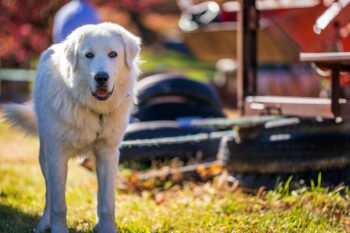Great Pyrenees, also known as Pyrenean Mountain Dogs, are majestic, fluffy giants known for their gentle demeanor and protective instincts. With their thick white coats and serene expressions, they often look like they’ve stepped out of a fairy tale. These dogs were originally bred to guard livestock, and they carry that guardian instinct into their role as family pets. Great Pyrenees are calm, loyal, and somewhat independent, but they are also incredibly affectionate with their families. Despite their large size and dignified appearance, they have a playful side that can surprise you. However, even these gentle giants eventually slow down as they reach their senior years. Typically, a Great Pyrenees is considered a senior around 6 to 7 years old, though some may start showing signs of aging a bit earlier or later depending on their health and lifestyle. As they age, Great Pyrenees might swap their vigilant guarding duties for more nap time in cozy spots. Let’s explore the different stages of a Great Pyrenees’ life and see how these magnificent dogs age with grace, humor, and a lot of fluff.
1. The Puppy Phase: Fluffy Balls of Cuteness
In the first year of a Great Pyrenees’ life, they are adorable, fluffy puppies with a curious and playful nature. Great Pyrenees puppies are known for their gentle disposition, but they also have a mischievous streak. They love to explore, chew on anything they can find, and play with their humans and other pets. This phase is characterized by a lot of growth, both physically and mentally. Early socialization and training are important to help them become well-behaved adults, as their size and strength can be a challenge. Despite their size, they are incredibly affectionate and love cuddling with their families. The puppy phase is a time of joy and discovery, filled with lots of laughs and a few chewed-up shoes.
2. The Adolescent Years: The Gentle Giant Teenager
From around 1 to 2 years old, Great Pyrenees enter their adolescent phase, which can be compared to the teenage years in humans. During this time, they continue to grow and develop, both physically and mentally. Adolescent Great Pyrenees are still playful but may also start asserting their independence. They can be a bit stubborn and may test boundaries, making consistent training and patience important. Despite their sometimes aloof behavior, they are deeply loyal and enjoy spending time with their families. This phase is a time of growth and learning, as they start to understand their role within the family and develop their protective instincts.
3. The Prime Years: Majestic and Protective
Between 2 and 6 years old, Great Pyrenees are in their prime. These years are marked by a balance of energy and maturity. Great Pyrenees in their prime are confident, strong, and protective of their families. They are typically calm and reserved but can be playful and affectionate when the mood strikes them. This is also the time when their guardian instincts are most pronounced, making them excellent watchdogs. Despite their imposing size, they are gentle and loving with their families, often being surprisingly cuddly and affectionate. The prime years are a time of adventure and bonding, with Great Pyrenees bringing a sense of security and love to their homes.
4. The Middle Ages: A Calm and Steady Presence
Around 6 to 7 years old, Great Pyrenees start to enter their middle-aged years. During this time, they may begin to slow down slightly, preferring more moderate activities over the intense play they once loved. This phase often brings a more relaxed and mellow attitude, although they still enjoy walks and gentle play. Great Pyrenees may start to show signs of aging, such as graying fur around the muzzle and a decrease in stamina. Despite these changes, they remain loyal and protective companions, enjoying the company of their families. Middle-aged Great Pyrenees often become more content with lounging around and observing their surroundings, making them perfect for peaceful days at home.
5. The Senior Years: Wise and Gentle Guardians
By the time a Great Pyrenees reaches 6 to 7 years old, they are generally considered seniors. This phase is marked by a noticeable reduction in energy levels and a greater appreciation for rest and comfort. Senior Great Pyrenees may develop age-related health issues such as arthritis, hip dysplasia, or thyroid problems, which can affect their mobility and overall well-being. However, their loving and protective nature remains unchanged, and they continue to bring a sense of calm and security to their families. They enjoy gentler activities, like short walks and plenty of nap time in their favorite spots. Their bond with their human companions deepens, and they often become even more affectionate and cuddly as they age.
Great Pyrenees, with their majestic presence and gentle hearts, bring a unique charm to every stage of life. From the playful puppy phase to the wise and dignified senior years, these dogs are full of character and love. While they may slow down as they age, their loyalty and affection for their families never waver. Each stage offers unique experiences and memories, making life with a Great Pyrenees a fascinating and heartwarming journey. Whether they’re quietly watching over the household or playfully engaging with their loved ones, Great Pyrenees have a special way of making every moment meaningful. So, cherish every stage with your Great Pyrenees, and enjoy the endless love and joy they bring into your life, from their fluffy beginnings to their golden years.
Frequently Asked Questions Someone Might Have About Their Aging Great Pyrenees
The post When Does a Great Pyrenees Reach Old Age? appeared first on iHeartDogs.com.

